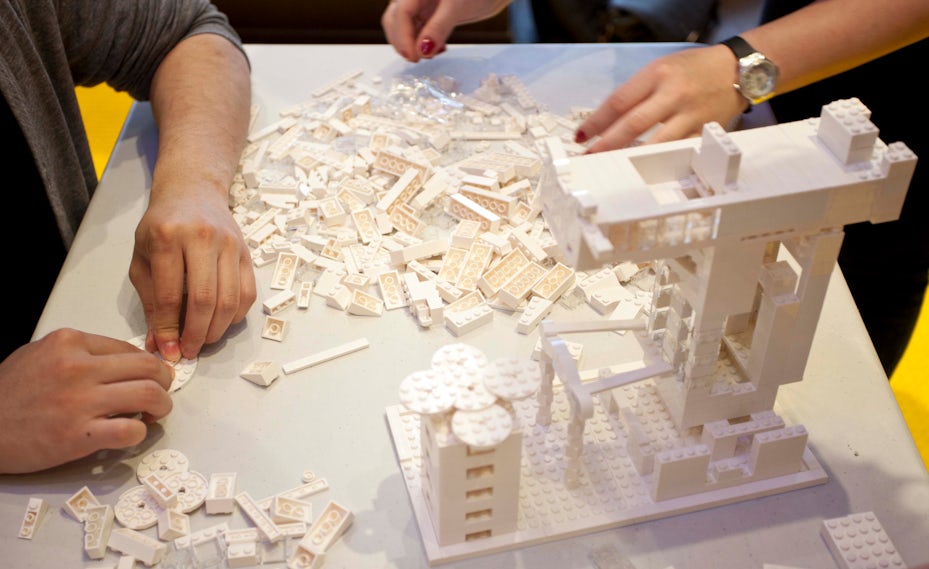Michael Riscica is a Licensed Architect from Portland, Oregon. He publishes a weekly blogpost on Young Architect for Architecture Students and Young Architecture Professionals. Michael wrote the book How To Pass The Architecture Registration Exam and is currently working on a book about ARE 5.0.
Pursuing my passion for architecture was definitely the best decision for me and my life. I discovered I wanted to become an architect when I was 21, and it amazes me how, after 15 years, my relationship with architecture has grown and matured. I continue to be just as excited about architecture as I was before and after architecture school.
There are a million great reasons to become an architect. I could have easily made a shortlist of 100. I think what has kept me so excited about architecture is that it has tapped into several strengths that I naturally possessed long before I ever decided to become an architect.
If you already possess the following qualities, architecture could well be your perfect profession.
1. You love projects of all kinds
You naturally organize everything into phases: a beginning, a middle and an end. You take pride in the process and thoroughly enjoy each phase of the project. You constantly go back and forth between seeing the details and the bigger picture of the project.
Projects could materialize as simple things like: making a dinner, building a website, fixing a bike or even learning a new skill. Some projects go on for years, others may die a quick or slow death. Ultimately, though, a well-done completed project brings you extreme feelings of satisfaction.
The dark side to being obsessed with projects is that there are soooo many projects going on in your life that you can become overwhelmed.

Young architects at work; via Owloo
2. You have preferences … lots of them
Many people don’t have any preferences about the stuff you have preferences about.
Maybe you overthink things. That’s OK.
You can usually provide concrete evidence for your preferences. The subjective validity of that evidence doesn’t really matter as long as it makes sense to you.
3. You stink at math … but don’t care
A lot of people say “I always wanted to become an architect, but I’m not very good at math.”
I can’t tell you how many times people have said to me. The reality is that many architects really aren’t that great at math either. The ones that are might use those skills to become engineers. Honestly, math is actually one of the first tests in becoming an architect.
Everyone who shouldn’t be an architect says: “I stink at math, I can’t do that.”
And stops the process right there.
The aspiring, successful architect says: “I know I stink at math and I don’t know how I will do it, but I will figure out how to hack my way through math, calculus, physics and structures. I’ll create the best support team to help me understand and get past all these tough classes.”
Math is only one of the many hurdles you’ll need to overcome in becoming an architect. I stink at math, but looking back, it wasn’t so hard.
4. You have as much passion for people as you do for buildings
You love learning about human beings, their cultures and differences. It is a never-ending topic of fascination — you are always asking yourself questions such as:
How are people different? How do they live differently? How are people affected by geography and climate? How do religion, economics and personal beliefs change how people interact with their environments?
… And then you look at how the architecture is affected.
How do people in Los Angeles or New York City live versus the rest of America? How do Americans live versus Europeans, Asians or the rest of the world? How do poor people live versus rich people? How do disabled people live and interact with the environment?
How humans interact with the architecture is what makes it so exciting. My passion for this idea has forced me to explore all over the globe, learning about people and their environments.
An architect’s job is providing a service that helps create a functional environment for clients with a variety of needs and wants. Having a passion for understanding about different types of people and cultures helps fuel the process.

Could you be the next Jean Nouvel, Frank Gehry, Zaha Hadid, Renzo Piano, Rem Koolhaas or Herzog and de Meuron? Photos by Gaston Bergeret; ©Supershock/Alamy; Brigitte Lacombe; Gamma-Rapho via Getty Images; Fred Ernst; ©Christian Charisius/Reuters/Corbis
5. You have as much passion for environments as you do for people
You are highly affected by your environments. You can see, feel and understand the energy in the environment. You may have relationships with objects, buildings and spaces similar to the relationships you have with people. Some environments can even elicit an emotional response from you. You may not even know why.
You also have an impeccable memory for most places and environments that you have visited or experienced.
6. You can be both a Generalist and a Specialist
Architecture is such a broad subject you could never learn it all. My professor once said: “Architecture is a reference profession. Architects shouldn’t try to memorize everything, they only really need to know where to go to reference the information they are looking for.”
All architects are Generalists by default. Being a Generalist is beaten into them, every step of the way. It’s the point of architecture school and the licensing process. They generally know a little bit about many different subjects to be able to guide their support team of specialists.
Being a Specialist is something that comes naturally. Architects all have a handful of subjects that are close to their hearts, those which they have chosen to become a specialist in. Some of those subjects could be: sustainability, accessibility, design, teaching, detailing, rendering, building envelopes, materials, history, engineering systems, business, politics … The list can go on forever.
When I took the Architect Registration Exam, it forced me to become a specialist in many subjects I had very little experience in, at least at the time of taking those exams. Looking back, this allowed me to become an even better Generalist.
7. You actively design everything
Design is about making decisions. Designers actively enjoy the decision-making process in all areas of their lives.
Everything is designed, or shall I say goes through a similar decision-making process.
Every decision that presents itself provides an opportunity to practice the design process.

Young architects at work; via AIA New Orleans
8. You are willing to sacrifice something
Everyone sacrifices something to become an architect at some point.
Maybe it’s a relationship, their social life, being in college for a long time, graduating with an enormous amount of student debt or your mental and physical health.
Time will always be the biggest sacrifice. It’s not such a big deal if you know what you are getting into or even really a sacrifice.
Your loved ones will also be affected by your sacrifices to pursue architecture, but they love you and are understanding and supportive of your decisions.
9. You are determined
You are competitive, resilient, disciplined, motivated and you actually love to work.
You look for opportunities to get ahead and are ready to seize them. If working all night while everyone is sleeping is what it takes, you are OK with that.
The ability to hustle (when needed) is the most important skill an architect could ever have. I’ll say that again. The ability to hustle is the most important skill an architect could ever have.
10. You are inspired by your teachers and mentors
Most architects who are further down the path than you are will be completely transparent with how they did it. They want to help you succeed and can be the very best guide to becoming an architect.
Showing a commitment toward becoming an architect, a passion for the subject and a love for the profession is the key to accessing this information.
This article first appeared on youngarchitect.com. Top image via AIA New Orleans
Architizer is building tech tools to help power your practice: Click here to sign up now. Are you a manufacturer looking to connect with architects? Click here.









